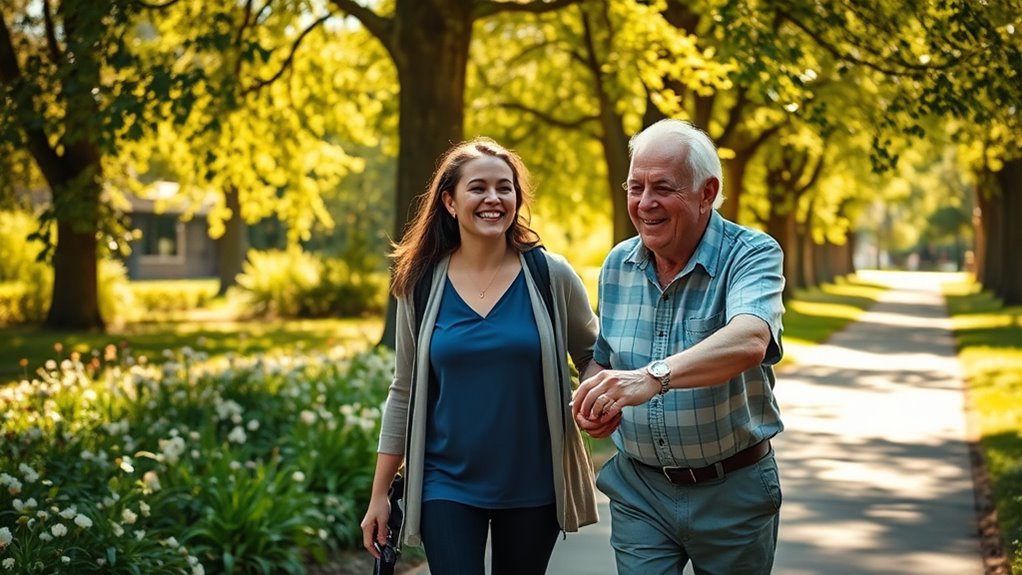Being kind to others boosts your mood by releasing feel-good chemicals and creating a sense of connection. Small acts like giving compliments or helping someone can increase your happiness and reduce stress. Recognizing kindness through gratitude practices also enhances your overall well-being. Plus, kindness strengthens social bonds, making you feel more supported and fulfilled. If you stay curious, you’ll discover how cultivating kindness can substantially elevate your daily happiness.
Key Takeaways
- Acts of kindness increase happiness by triggering positive feelings and reinforcing gratitude.
- Engaging in kindness enhances social bonds, reducing stress and boosting overall joy.
- Practicing kindness and gratitude together promotes resilience and a more optimistic outlook.
- Small, everyday gestures can transform routines into memorable, mood-boosting experiences.
- Recognizing kindness from others fosters appreciation, strengthening well-being and emotional health.

Have you ever wondered how small acts of kindness can boost your happiness? It’s a simple idea, but one with powerful effects. When you engage in kindness, you’re not just helping others—you’re also nurturing your own well-being. One way this happens is through gratitude practices. When you take a moment to recognize and appreciate the kindness you receive or witness, you reinforce positive feelings within yourself. Whether it’s writing a thank-you note or simply reflecting on what you’re grateful for, these practices help you focus on the good, making you more aware of the kindness around you. This awareness creates a ripple effect, encouraging you to act kindly in return, which amplifies your happiness.
Social connection plays an essential role here. Acts of kindness often deepen your relationships with others, fostering a sense of belonging and trust. When you help someone out or share a kind word, you’re building bonds that can last a lifetime. These social connections are linked to increased happiness because humans are inherently social beings. When you feel connected, you experience less stress and more joy. The warmth of a kind gesture can turn an ordinary day into a memorable one for both you and the recipient. It’s not just about grand gestures; small acts—like holding the door open, giving a compliment, or listening attentively—can profoundly strengthen your social ties. Over time, these small acts accumulate, creating a network of support and positivity that boosts your mood.
Practicing kindness also encourages you to be more mindful of others’ needs, which can shift your perspective from self-centered concerns to a more empathetic outlook. This shift is vital for cultivating gratitude. When you notice the kindness others show you, or when you intentionally perform acts of kindness, you develop a greater appreciation for life’s blessings. This gratitude, in turn, enhances your overall happiness, making you more resilient during tough times. It’s a cycle: kindness fuels gratitude, which fosters social connection, and these elements collectively lift your mood. Additionally, understanding grocery store hours and planning around them can reduce stress during shopping trips, freeing up more time for acts of kindness with loved ones.
Frequently Asked Questions
Can Random Acts of Kindness Improve Long-Term Mental Health?
Yes, random acts of kindness can improve your long-term mental health. When you practice kindness, you build emotional resilience and develop a habit of daily gratitude, which helps you cope better with stress and setbacks. Over time, these small acts boost your overall well-being, foster positive connections, and create a more optimistic outlook. Consistently engaging in kindness strengthens your mental health, making you more resilient and happier in the long run.
Is There a Genetic Component to Kindness and Happiness?
Yes, there’s a genetic component to kindness and happiness. Your genetic predispositions influence how likely you are to experience happiness inheritance and express kindness. While genes play a role, your environment and choices matter more. You can cultivate kindness and boost your happiness through actions and mindset, regardless of your genetic makeup. So, even if happiness inheritance runs in your family, your efforts can still shape your well-being.
How Does Kindness Influence Social Relationships Over Time?
When you practice kindness consistently, you strengthen emotional bonds and foster trust development with others. Over time, your acts of kindness encourage reciprocal behavior, deepening your social relationships. This ongoing cycle of positive interactions creates a supportive network, making your connections more resilient. As trust grows, your relationships become more meaningful, leading to increased happiness and emotional well-being for both you and those around you.
Are Some Types of Kindness More Effective Than Others?
Some types of kindness, like altruistic gestures and daily kindness, tend to be more effective because they create genuine connections, foster trust, and promote positive feelings. When you perform acts motivated by genuine care rather than obligation, you’re more likely to boost your mood and strengthen relationships. Consistently practicing daily kindness and altruistic gestures not only benefits others but also enhances your own happiness and emotional well-being.
Can Practicing Kindness Reduce Stress and Anxiety?
Practicing kindness can considerably reduce your stress and anxiety. When you engage in mindfulness meditation, it helps you stay present and calm, making it easier to be kind to others. Gratitude journaling shifts your focus to positive aspects of your life, boosting your mood and easing anxiety. By regularly showing kindness, you create a positive feedback loop that lowers stress levels and promotes emotional well-being.
Conclusion
So, next time you’re feeling down, don’t just binge-watch your favorite show—try being kind instead. Spoiler alert: it might just turn your frown upside down. Who knew that a little kindness could actually boost your mood, rather than making you feel like a saint? So go ahead, smile at a stranger or help a friend. After all, what’s more rewarding than feeling happy while pretending you’re the selfless hero of your own story?









